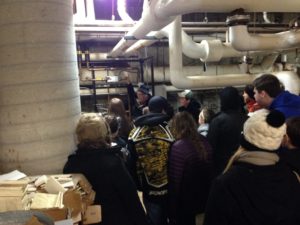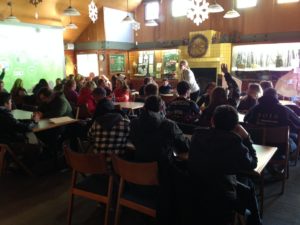By YES! Coordinator Katelyn Larsen
Students from the Mankato West, Minnesota New Country School, and Sleepy Eye YES! teams came together on March 2, 2016 to learn about sustainability from sourcing materials to end use. Students began the day by learning about and touring the sustainable practices in place at Gustavus Adolphus College from Jim Dontje, Chair and Director of the Johnson Center for Environmental Innovation.
 Dontje showed the students the solar thermal installation on the Jackson Campus Center, which supplies partial water heating to the campus center, as well as the solar electric installation on Olin Hall. He also took the group down to look at the mechanics behind the solar thermal installation at the Lund Center, which supplies partial pool heating and domestic hot water. Currently, Gustavus is using the energy produced from its solar panels to offset the energy it consumes from the grid. The solar panels in place do not have battery storage, but that is something the college may look at in the future.
Dontje showed the students the solar thermal installation on the Jackson Campus Center, which supplies partial water heating to the campus center, as well as the solar electric installation on Olin Hall. He also took the group down to look at the mechanics behind the solar thermal installation at the Lund Center, which supplies partial pool heating and domestic hot water. Currently, Gustavus is using the energy produced from its solar panels to offset the energy it consumes from the grid. The solar panels in place do not have battery storage, but that is something the college may look at in the future.
Aside from renewable energy, Gustavus is achieving sustainability through its cafeteria and food waste. To reduce food waste, Gustavus practices an à la carte system in the cafeteria as opposed to an “all you can eat buffet” found in most universities. From there, pre-consumer and post-consumer food waste goes through a food pulper that breaks food down into smaller pieces. All of the food waste produced on campus is then composted on site in a vessel composter. It takes about three weeks for the compost to mature, which is a lot faster than passive composting systems. After maturation, the compost is used on campus grounds or in the community garden in St. Peter.
To bring everything full circle, Gustavus installed a greenhouse a few years ago that Dontje is working to convert into a deep winter greenhouse, which would enable food to be grown in the winter months. Dontje indicated that the primary reason for having the greenhouse on campus is to further student learning, but it also produces greens and other produce for the cafeteria.
 After finishing up the morning tours, students ate in the cafeteria and enjoyed having a plethora of options. Following lunch, Jenna Totz, Curriculum Coordinator with Climate Generation: A Will Steger Legacy, helped the students connect what they learned about waste with climate change. She stressed that while we don’t normally associate waste with energy, everything is related.
After finishing up the morning tours, students ate in the cafeteria and enjoyed having a plethora of options. Following lunch, Jenna Totz, Curriculum Coordinator with Climate Generation: A Will Steger Legacy, helped the students connect what they learned about waste with climate change. She stressed that while we don’t normally associate waste with energy, everything is related.
Totz explained the life cycle of goods to the students, breaking each step down along the way: materials extraction, manufacturing, distribution, usage, and end of life management. Then, students gathered in groups and chose a simple product and demonstrated its life cycle. Groups visited other groups and made recommendations to reduce energy at various points along the cycle. By the end, all students were able to make the connection between choices they make and impacts on the Earth.
Everyone enjoyed themselves, and positive conversations were heard throughout the workshop. From conversations on vegetarianism and veganism to gathering ideas on encouraging others to be less lazy about the environment, students and coaches enjoyed engaging with each other and with experts.
